8 Top AI for Lawyers Tools in 2025
Transforming the Legal Landscape: The Rise of AI in 2025
The legal profession is experiencing a significant shift with the growing influence of artificial intelligence (AI). Legal tech and AI tools, once a futuristic vision, are now indispensable for lawyers in 2025. These tools offer substantial gains in efficiency, accuracy, and strategic decision-making, empowering legal professionals, healthcare providers, and security and compliance officers to manage more complex tasks and enhance their services.
Faced with increasing pressure to achieve more with fewer resources, professionals across these sectors are adopting AI-powered solutions to optimize workflows and gain a competitive advantage. However, with a rapidly expanding market of AI tools, selecting the right one for specific needs can be challenging.
Navigating the AI Landscape
This article explores the top 8 AI-powered tools transforming the legal field in 2025, providing valuable insights for navigating this technological evolution. We will examine how these tools address key challenges, from time-consuming document review and intricate legal research to predicting litigation outcomes and improving client communication.
Choosing the right AI tool depends on several factors:
- The specific tasks you aim to automate
- Integration with existing systems
- Data security considerations
- Pricing and technical requirements
An effective legal AI tool should not only automate tasks but also enhance your expertise by providing actionable insights and elevating the overall quality of your work.
Making Informed Decisions
Whether your goal is to enhance due diligence processes, streamline contract analysis, or gain a deeper understanding of legal precedents, this guide will equip you with the knowledge needed to make informed decisions and leverage the power of AI in 2025. Now, let's explore the top 8 AI tools shaping the future of law.
1. Whisperit: Dictate Your Way to Efficiency
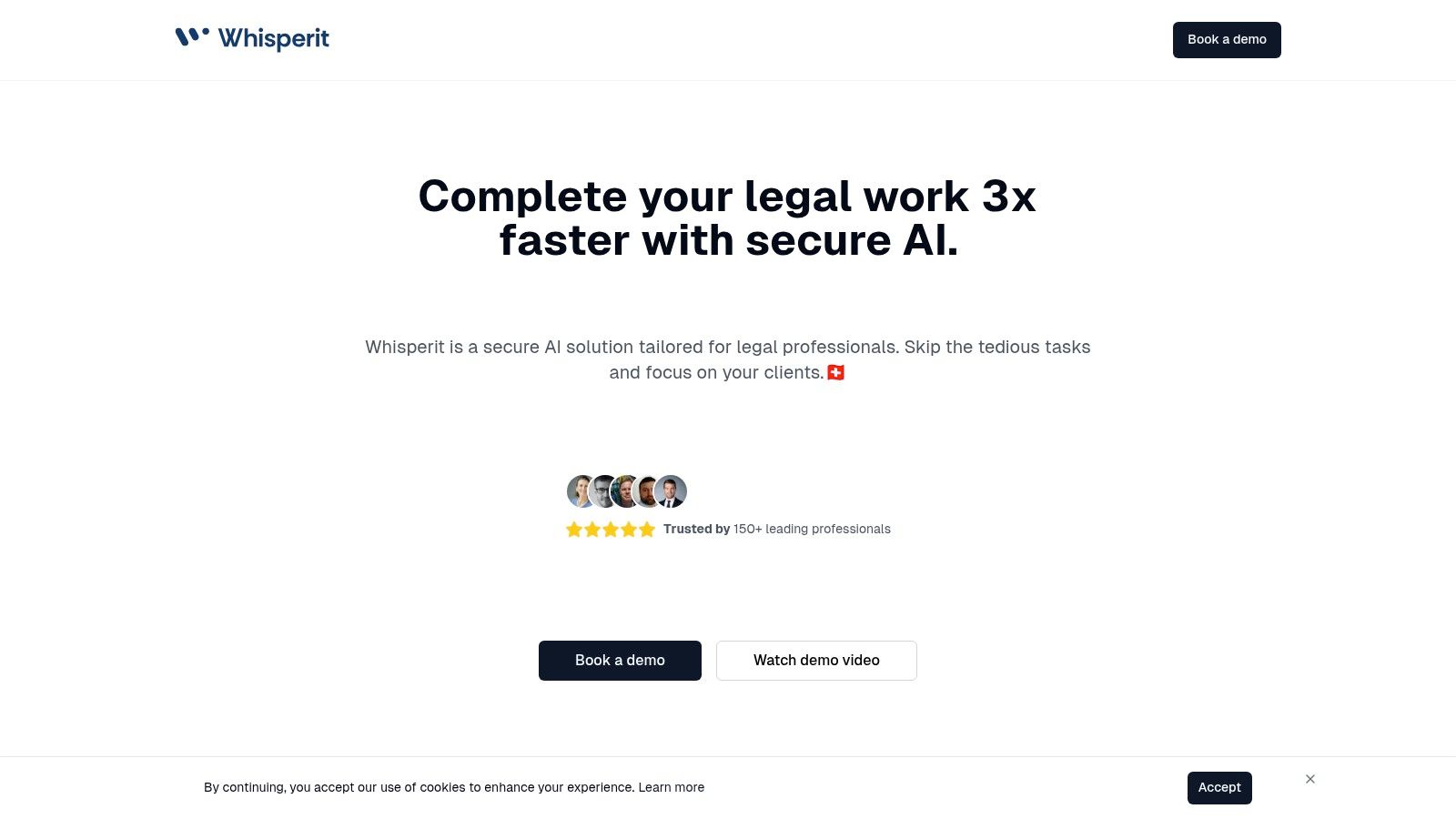
For legal professionals constantly dealing with paperwork, Whisperit offers an AI-powered solution. This dictation and text editing platform accelerates document creation and management, allowing lawyers to focus on more strategic tasks. Whisperit addresses a key pain point: the time spent drafting and editing legal documents. Its AI handles dictation, transcription, and editing, promising up to 2x faster document production.
Practical Applications for Legal Professionals:
- Dictating Legal Briefs and Motions: Draft complex legal arguments on the go by dictating into Whisperit. The platform transcribes your speech in real-time, minimizing typing and allowing for faster revisions.
- Creating Client Communications: Quickly generate letters, emails, and other client correspondence using voice dictation. This is especially helpful for urgent communications or when away from your desk.
- Preparing Contracts and Agreements: Streamline contract creation by dictating clauses and amendments. Whisperit handles the formatting and transcription.
- Generating Meeting Minutes and Notes: Capture important discussions during client meetings or court proceedings through voice dictation, ensuring accurate records.
Features and Benefits
- AI-Powered Dictation, Transcription, and Editing: Whisperit's core strength is its advanced AI. It accurately transcribes spoken words and suggests edits, reducing manual work.
- Customizable Templates: Pre-built and customizable templates for common legal documents speed up drafting and ensure consistency.
- Document Import: Integrate Whisperit into your workflow by importing existing documents for editing and revisions.
- Secure Processing on Private Swiss Servers: Whisperit prioritizes data security and privacy with robust measures, including Swiss-based servers, end-to-end encryption, and GDPR and SOC 2 compliance.
Pros and Cons
Pros:
- Significantly faster document creation and editing.
- Robust security with Swiss hosting and GDPR and SOC 2 compliance.
- Customizable templates and easy document import.
- Testimonials from legal and healthcare professionals report up to 3x faster completion rates.
Cons:
- Current focus is primarily on legal and related sectors.
- Pricing and integration options require direct contact.
Pricing and Technical Requirements
Contact Whisperit directly for a demo and pricing information.
Comparison With Similar Tools
Whisperit stands out with its focus on the legal sector, offering specialized features like customizable legal templates and robust security. Other tools may have broader appeal, but Whisperit is tailored for legal professionals.
Implementation Tips
- Use the customizable templates for common document types.
- Experiment with the dictation and editing features.
- Contact Whisperit for integration needs and pricing.
Whisperit offers a powerful solution for legal professionals seeking to save time and increase productivity. Its AI, specialized features, and robust security make it a valuable legal tech tool. While the lack of public pricing information is a minor inconvenience, the potential benefits make it worth exploring.
2. ROSS Intelligence
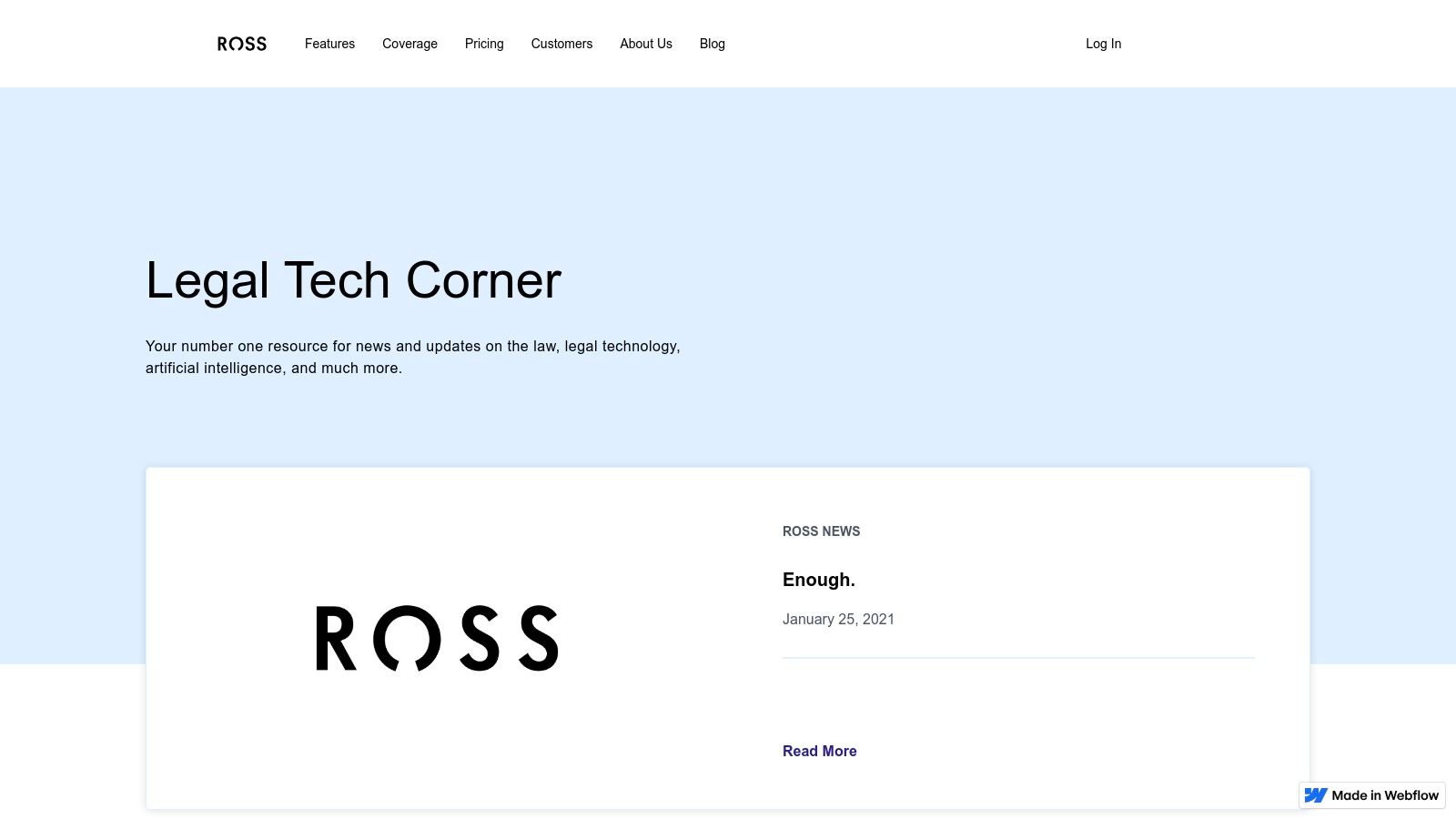
ROSS Intelligence, though defunct, remains a significant figure in the history of AI-driven legal tools. It was a pioneer in using Natural Language Processing (NLP) for legal research, laying the groundwork for many tools used today. Before shutting down in January 2021 due to a legal battle with Thomson Reuters, ROSS offered a powerful platform to simplify legal research.
Attorneys could ask complex legal questions in everyday language, similar to consulting a colleague. ROSS would then analyze extensive legal databases and provide relevant case law, statutes, and other crucial information.
Imagine asking, "What is the precedent for self-driving car liability in California?" and receiving a curated list of relevant cases and statutes within seconds. That was ROSS Intelligence's value proposition. Key features included:
- Natural language legal research queries
- AI-powered document analysis for contextual understanding
- Instant citation finding and verification
- Integration with existing legal databases
This approach yielded more comprehensive results than traditional Boolean searches, significantly reducing research time – by some estimates, up to 30%. The user-friendly interface required minimal training, making it accessible to legal professionals regardless of their technical skills.
Benefits and Drawbacks
While ROSS Intelligence offered substantial benefits, it also had its limitations. Its scope was restricted to US law. The subscription cost was also relatively high, presenting a challenge for smaller firms. For a broader perspective on the current landscape, you might find our Complete Guide to Legal Research with AI helpful.
Lasting Legacy
Despite its closure, ROSS Intelligence remains important. It demonstrated the potential of AI in legal research. Its innovative use of NLP and emphasis on user experience set a new standard for legal tech, influencing the development of many current AI-powered legal research tools. Although ROSS Intelligence is no longer available, understanding its capabilities and limitations offers valuable context for evaluating today's legal AI research platforms.
3. Casetext CARA A.I.
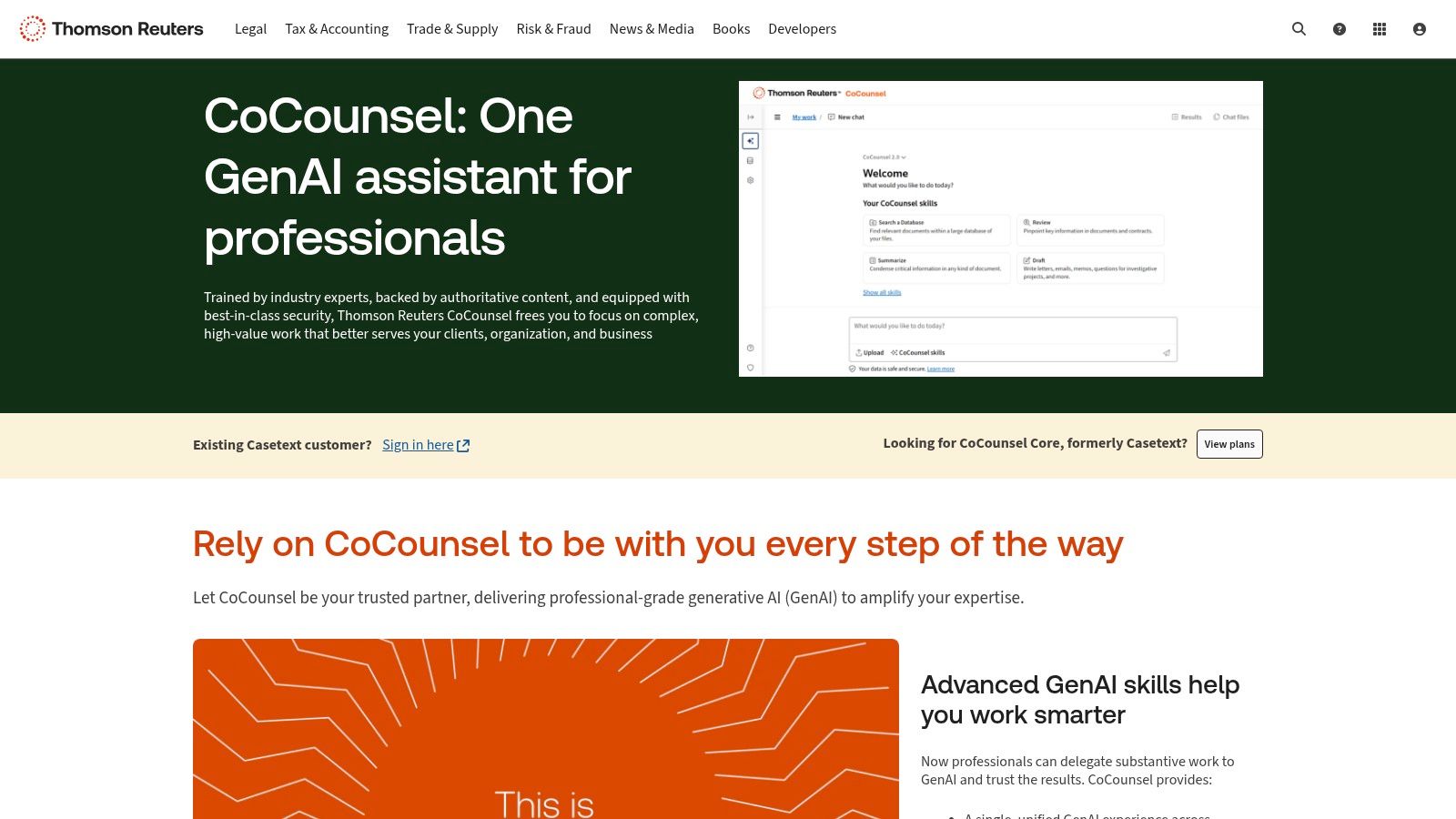
Casetext's CARA A.I. (Case Analysis Research Assistant) stands out for its powerful, AI-driven approach to legal research. It streamlines the process of finding relevant case law, making it a valuable tool for legal professionals. Its brief analyzer and parallel search functionality help uncover precedents that might otherwise be missed, saving time and resources.
While its database may not be as extensive as established platforms like Westlaw or LexisNexis, CARA A.I.'s intuitive interface and affordability make it an attractive option. This is especially true for smaller firms or solo practitioners.
Practical Applications & Use Cases
CARA A.I. offers a range of applications for various legal tasks:
- Brief Preparation and Review: Upload briefs to identify potentially relevant cases, statutes, and legal concepts. This ensures comprehensive legal arguments and minimizes the risk of missing critical precedents.
- Legal Memo Drafting: CARA A.I. can assist in drafting legal memos by quickly surfacing relevant authority, ensuring thoroughness and accuracy.
- Document Comparison: Compare legal documents to quickly identify precedential similarities and differences. This is particularly useful when analyzing contracts and pleadings.
- Citator Integration: Validate legal citations to ensure arguments are based on sound, up-to-date law. This automated process reduces reliance on outdated precedents.
- Case Law Summarization: Quickly grasp the key points of lengthy court decisions with AI-powered summarization. This allows for efficient review and analysis of potentially relevant cases.
Features and Benefits
Here are some key features and benefits of using Casetext CARA A.I.:
- Brief Analyzer: Identifies missing authorities in legal documents.
- Document Comparison Tools: Finds precedential similarities.
- Parallel Search: Searches for related legal concepts.
- Automated Citator: Checks the validity of legal citations.
- AI-Powered Case Law Summarization: Provides concise summaries of key cases.
Pros and Cons
Pros:
- Significantly reduces research time.
- Identifies relevant cases often missed by manual research.
- Intuitive interface with minimal learning curve.
- More affordable than many traditional legal research tools (pre-Thomson Reuters acquisition).
Cons:
- Coverage more limited than Westlaw or LexisNexis.
- Primarily focused on US law.
- Thomson Reuters acquisition may change pricing (pricing information unavailable on the Casetext website).
Implementation/Setup Tips
While Casetext CARA A.I. is intuitive, maximizing its benefits involves effective query structuring. Focus on using precise keywords that reflect the legal issues at hand. Experiment with different search parameters to refine results and leverage the brief analyzer and document comparison features.
Comparison with Similar Tools
Westlaw and LexisNexis offer broader databases. However, Casetext CARA A.I. offers AI-powered features designed for streamlined legal research workflows. Its focus on practical applications and ease of use makes it a compelling alternative for those seeking a targeted and affordable solution.
Website and Future Considerations
Website: https://casetext.com
The Thomson Reuters acquisition introduces uncertainty regarding future pricing and integration with Westlaw. Monitoring these developments is crucial for Casetext users. Despite this, CARA A.I.'s core functionalities remain valuable for legal professionals seeking enhanced research efficiency.
4. Kira Systems

Kira Systems is a leading AI-powered contract analysis platform designed for legal professionals. It addresses the often tedious task of contract review, allowing lawyers to focus on more strategic work. Used primarily in due diligence, regulatory compliance, and general contract analysis, Kira employs machine learning to quickly analyze large volumes of documents and extract key provisions. This saves valuable time and resources, making it particularly useful in fast-paced legal fields like mergers and acquisitions, real estate, and corporate law.
Kira Systems offers a robust set of features. Its core functionality is automated contract provision extraction and analysis, which streamlines the identification of important clauses. Built-in smart fields for common legal provisions speed up the review process. Firms can also create custom machine learning models tailored to their specific needs and document types. Its bulk document processing capabilities are essential for large projects, and integration with existing document management systems ensures seamless workflow integration. For a broader look at this technology's development, check out this article: AI in Legal Document Analysis: A Timeline.
Benefits of Kira Systems
Implementing Kira Systems offers substantial benefits. The platform can potentially reduce contract review time by up to 90%, significantly boosting efficiency. This increased speed also leads to improved accuracy in due diligence by minimizing human error. The platform's customizability ensures its relevance across various practice areas and specific firm requirements. Finally, Kira Systems consistently achieves high accuracy rates compared to manual review, increasing the reliability of extracted data.
Considerations for Potential Users
There are some factors to consider before implementing Kira Systems. The initial investment can be substantial, posing a challenge for smaller firms. There's also a learning curve associated with training custom models, requiring a time investment for optimal use. While beneficial in various situations, Kira Systems is most effective for firms with high volumes of similar documents, where its automation capabilities are fully utilized.
While specific pricing and technical details aren't publicly available, you can learn more on the Kira Systems website. Similar platforms like LawGeex and Seal Software (now part of DocuSign) provide comparable contract analysis functions. Before implementing any such system, clearly define your firm's needs and document types to ensure optimal configuration and training. This focused approach maximizes ROI and streamlines the platform's integration into your existing workflows.
5. LexisNexis Lexis+ AI

LexisNexis Lexis+ AI stands out as a powerful AI-enhanced legal research platform. Built on the extensive LexisNexis database, it seamlessly integrates AI into the familiar LexisNexis ecosystem. This offers significant advantages for legal professionals already working within that environment. By combining traditional research with AI-powered tools like conversational search and brief analysis, Lexis+ AI streamlines workflows and provides deeper insights for legal strategy.
Lexis+ AI is particularly useful for legal professionals, healthcare providers navigating complex regulations, and security and compliance officers needing up-to-date legal information. Let's take a closer look at its practical applications:
Practical Applications
- Legal Research: Ask complex legal questions in natural language using Lexis Answers. Receive comprehensive responses drawn from statutes, case law, and secondary sources. This conversational AI approach simplifies research, saving valuable time.
- Brief Analysis & Drafting: Lexis+ AI's Brief Analyzer reviews and enhances legal documents. It identifies potential weaknesses, missing precedents, and areas for improvement. It also assists with automated document drafting, suggesting relevant clauses and language based on similar cases.
- Litigation Strategy: The platform provides predictive legal analytics, offering insights into potential case outcomes. This is based on similar precedents and judge behavior analysis through the Context feature. This feature allows for more informed decision-making and strategic planning.
- Judge & Expert Witness Research: Understand a judge's history, rulings, and potential biases using Context. This allows lawyers to tailor their arguments effectively. Similarly, research expert witnesses to assess their credibility and potential impact on a case.
- Compliance & Regulatory Research: Security and compliance officers can use Lexis+ AI to stay informed about evolving legal landscapes. This ensures their organizations adhere to the latest regulations and minimize legal risks. Healthcare providers can also use the platform to navigate complex healthcare laws and regulations.
Features
- Conversational AI search (Lexis Answers)
- Brief Analyzer for document review and enhancement
- Precedent-based recommendations
- Automated document drafting assistance
- Predictive legal analytics
- Judge and expert witness analytics (Context)
Pros
- Built upon the comprehensive LexisNexis legal database
- Seamless integration with existing LexisNexis products
- Provides actionable insights for litigation strategy
- Regular updates and improvements based on user feedback
Cons
- Higher subscription costs compared to some newer legal AI tools. Pricing is generally tied to existing LexisNexis subscriptions and requires additional modules for advanced features. Contact LexisNexis directly for detailed pricing information.
- Can be overwhelming for users unfamiliar with the LexisNexis ecosystem.
- Some advanced features, like Context, require separate subscriptions.
Implementation/Setup Tips
- Existing LexisNexis users will find integration relatively straightforward. Training resources and customer support are available to facilitate the transition.
- New users should utilize available tutorials and training materials to familiarize themselves with the LexisNexis platform and the specific features of Lexis+ AI.
Comparison With Similar Tools
While other AI legal research tools exist, Lexis+ AI differentiates itself through its integration with the vast LexisNexis database. It focuses on providing comprehensive solutions for various legal tasks, from research and drafting to litigation strategy. Westlaw Edge also offers AI-powered features.
Website
https://www.lexisnexis.com/en-us/products/lexis-plus.page
LexisNexis Lexis+ AI represents a significant advancement in integrating AI into legal practice. While the cost may be a factor for some, its comprehensive features and integration with the established LexisNexis ecosystem make it a strong option for legal professionals. This tool helps enhance their research and strategic capabilities.
6. Lex Machina (LexisNexis)
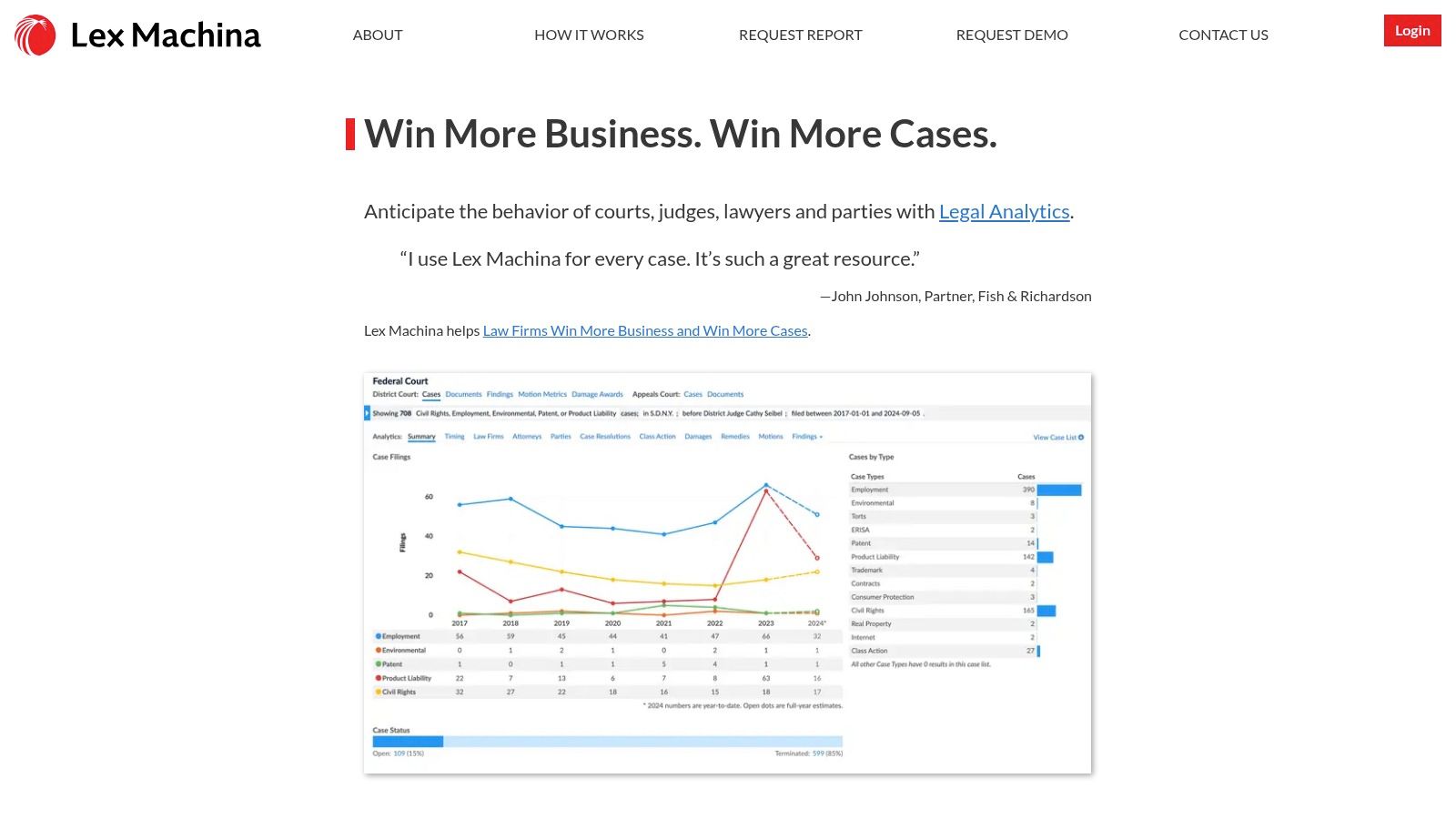
Lex Machina, a company under the LexisNexis umbrella, stands out as a robust legal analytics platform. Using AI and natural language processing (NLP), it extracts actionable insights from millions of court documents. This makes it especially useful for legal professionals handling litigation, offering a data-driven approach to strategy, case assessment, and even business development.
Healthcare providers and security/compliance officers facing legal disputes can also find value in Lex Machina. Its ability to predict case outcomes and timelines can be a significant advantage in navigating complex legal challenges.
Lex Machina analyzes court records to identify key patterns and trends, transforming raw data into usable intelligence.
Key Features and Benefits
- Judge and Attorney Analytics: Gain insights into a judge's tendencies and opposing counsel’s strategies. This knowledge allows you to tailor your approach for the best possible results.
- Predictive Case Outcome Assessment: Using historical data, Lex Machina estimates the likely outcome of a case, including potential damages and timelines. This feature is critical for informed decision-making during settlement negotiations.
- Timing Analytics: Predict case milestones accurately and effectively manage client expectations throughout the litigation process.
- Opposing Counsel Analysis: Develop a tactical advantage by understanding your opponent’s typical litigation strategies and historical success rates.
- Customizable Alerts: Stay informed about relevant case developments and rulings with automated alerts. This saves valuable time and ensures you’re always up-to-date.
Practical Applications
- Litigation Strategy: Develop data-backed strategies based on historical trends and opposing counsel behavior.
- Case Assessment: Evaluate the merits of a case and potential outcomes early on in the litigation process.
- Business Development: Identify potential clients and areas of legal expertise by analyzing litigation trends in specific industries or jurisdictions.
- Client Management: Set realistic expectations with clients by providing data-driven estimates of case timelines and potential outcomes.
Pros
- Provides quantitative insights for informed litigation strategies.
- Helps set realistic client expectations.
- Offers valuable competitive intelligence for business development.
- Regularly updated with new court data to ensure accuracy.
Cons
- Pricing: Premium pricing may be a barrier for smaller firms or individual practitioners.
- Training: Requires some training to fully utilize the platform’s analytical capabilities.
- Coverage: Coverage varies by practice area and jurisdiction, so its usefulness depends on your specific needs.
Website: Lex Machina
Pricing and Technical Requirements
Pricing information isn't publicly available and requires contacting LexisNexis directly. Being a web-based platform, the technical requirements are minimal, primarily needing a stable internet connection and a modern web browser.
Implementation/Setup Tips
- Focus: Begin with a specific practice area to maximize the learning curve and immediate benefits.
- Training: Utilize the available training resources and customer support to understand the platform's functionalities.
- Refinement: Regularly review and refine your search queries to ensure you’re capturing the most relevant data.
Lex Machina differentiates itself from other legal research tools like Westlaw and Lexis Advance by focusing specifically on litigation analytics and predictive modeling. While those platforms provide broad legal research capabilities, Lex Machina delves deeper into the data, providing actionable insights specifically for litigators. This makes it a valuable tool for any legal professional, particularly those focused on litigation strategy and optimal client outcomes.
7. Harvey

Harvey is an AI legal assistant designed for legal professionals. Using generative AI and large language models, Harvey helps with tasks like contract analysis, legal research, document drafting, and due diligence. Its visibility increased significantly after Allen & Overy, a leading international law firm, announced a firm-wide adoption of the technology. Built for integration with current legal workflows, Harvey understands the subtleties of legal language and contexts.
This tool is noteworthy due to its specialized legal focus and potential to improve the efficiency of legal work. Trained on legal documents and case law, Harvey can significantly reduce the time spent on routine drafting. This allows lawyers to focus on higher-level strategic thinking and client interaction.
Key Features and Benefits
- Legal Document Generation and Editing Assistance: Harvey can generate and edit legal documents, streamlining drafting processes.
- AI-Powered Contract Review and Risk Identification: The platform analyzes contracts, identifying potential risks and highlighting key clauses.
- Case Law Analysis and Summarization: Harvey analyzes and summarizes relevant case law, speeding up legal research.
- Multi-Language Support for International Legal Work: Multi-language capabilities make it valuable for international legal practices.
- Secure Environment for Confidential Legal Information: Harvey prioritizes data security with an enterprise-grade environment for confidential client information.
Pros
- Specifically Trained on Legal Documents and Case Law: This specialized training allows Harvey to understand the complexities of legal language.
- Reduces Time Spent on Routine Drafting Tasks: Automating repetitive tasks frees up lawyers for more strategic work.
- Enterprise-Grade Security for Client Confidentiality: Robust security protects sensitive client data.
- Continuous Learning From User Interactions: The platform constantly learns and improves based on user feedback.
Cons
- Targeted at Large Law Firms: Pricing is not public, suggesting a focus on enterprise clients with larger budgets.
- Limited Public Information: The lack of public information can make it hard to assess suitability for specific needs.
- Relatively New Platform: Harvey is newer than established platforms like LexisNexis and Westlaw.
You might be interested in: Our guide on AI Legal Assistants for more on how these tools are changing modern law practice.
While pricing and technical details are not public, Harvey's focus on enterprise solutions indicates a substantial investment. If your firm is considering AI solutions and has the necessary budget, Harvey is a potentially powerful tool for improved efficiency and accuracy. Its emphasis on security and confidentiality makes it attractive for handling sensitive client data. However, smaller firms or those with tighter budgets may want to consider other options. As Harvey evolves and more information becomes available, its impact on the legal field will be interesting to observe. Visit the Harvey website for more details.
8. CoCounsel by Casetext
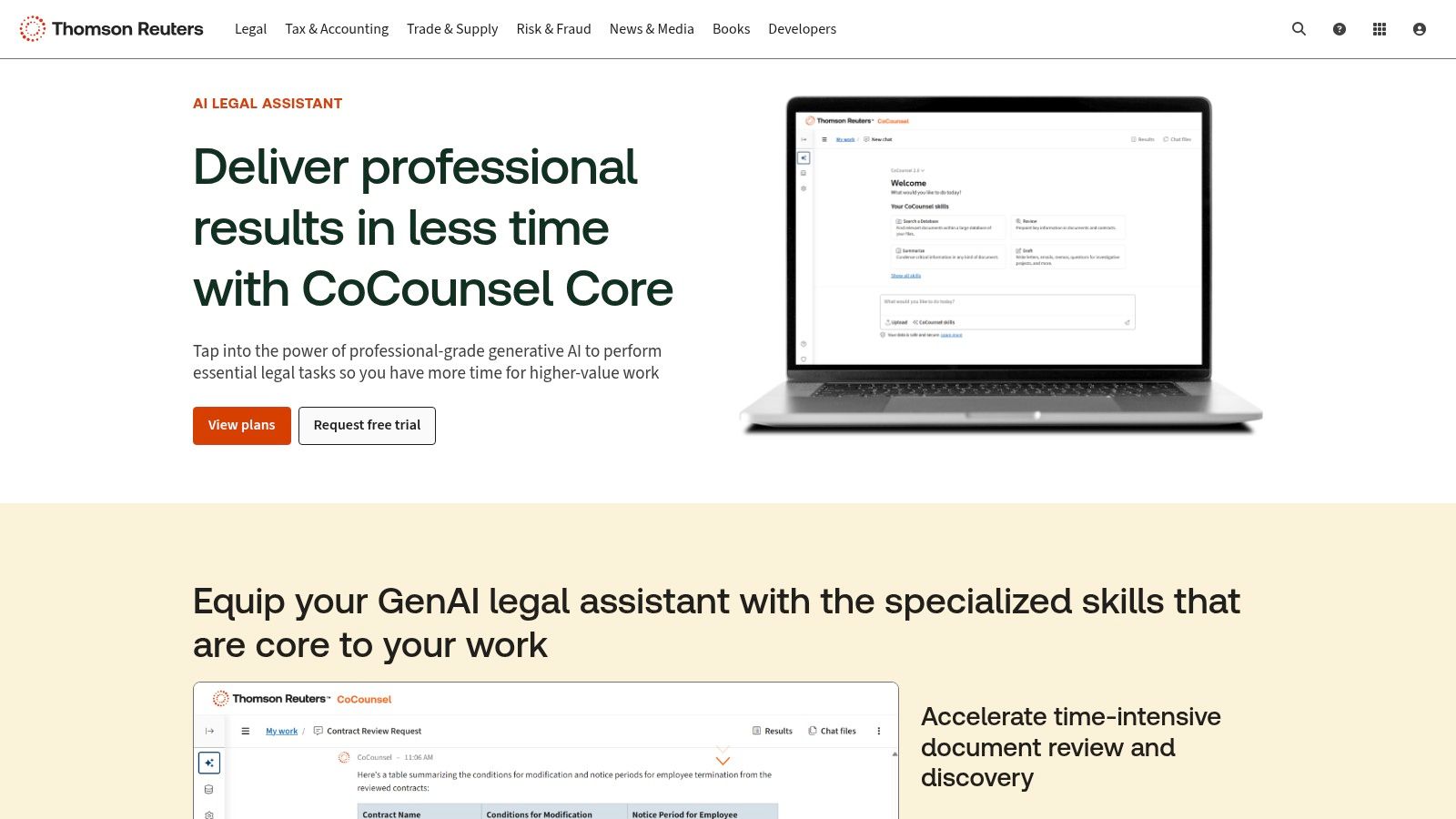
CoCounsel, developed by Casetext (now part of Thomson Reuters), is a powerful AI legal assistant designed for the complexities of legal work. Powered by GPT-4 and trained on legal data, CoCounsel blends advanced AI with legal accuracy and reliability. This makes it a valuable tool for legal professionals, healthcare providers dealing with legal and compliance issues, and security/compliance officers navigating regulations.
Practical Applications and Use Cases
CoCounsel offers a range of applications for various legal tasks:
- Legal Research: CoCounsel analyzes case law and statutes, providing cited sources. This speeds up research, allowing lawyers to focus on strategy. It's also invaluable for healthcare providers and compliance officers researching regulations and precedents.
- Document Review: CoCounsel summarizes lengthy documents, extracts key points, and identifies potential risks or inconsistencies, saving time and effort. This is especially helpful for compliance officers reviewing policies and security professionals analyzing reports.
- Contract Analysis: Analyzing contracts, identifying key clauses, and flagging potential risks are crucial. CoCounsel assists lawyers in drafting and reviewing contracts and benefits healthcare providers negotiating agreements.
- Deposition Preparation: Preparing for depositions can be streamlined with CoCounsel. It generates outlines, suggests questions, and analyzes transcripts, helping lawyers anticipate questioning and develop strategies.
- AI-Powered Legal Memo Drafting: CoCounsel drafts legal memos based on specific facts and issues. Lawyers can generate initial drafts quickly and then refine them with their expertise.
Features and Benefits
CoCounsel's targeted approach to legal work offers distinct advantages:
- Legally-Specific Training: Unlike general AI tools, CoCounsel’s training on vast legal datasets results in more accurate and legally sound outputs.
- Citation Validation: CoCounsel provides citations for its research, ensuring reliability and allowing users to verify information.
- Integration with Existing Workflows: CoCounsel integrates seamlessly into existing legal workflows for maximum efficiency.
Pros and Cons
Understanding the advantages and disadvantages is key:
- Pros: Built on GPT-4 with legal guardrails, focused on accuracy and substantiation, integrates with existing workflows, includes citation validation.
- Cons: Subscription-based pricing (contact Casetext for details), evolving technology with limitations in complex reasoning, requires human oversight.
Implementation and Setup Tips
Access is likely provided through a web-based interface upon subscription. Users should familiarize themselves with the platform’s functions and tutorials. CoCounsel augments, not replaces, legal expertise. Always verify its outputs before relying on them.
Comparison with Similar Tools
While other AI tools offer legal functions, CoCounsel distinguishes itself with its focus on legal accuracy and integration with Casetext’s legal database. This, along with features like citation validation, makes it a robust choice for legal professionals compared to general AI writing tools.
Website: https://casetext.com/cocounsel
8 AI Tools for Lawyers: Core Feature Comparison
| Product | Core Features ✨ | User Experience ★ | Value Proposition 💰 | Target Audience 👥 | Pricing / Availability |
|---|---|---|---|---|---|
| 🏆 Whisperit | AI dictation, transcription, editing, document import, customizable templates, secure Swiss hosting | Fast document creation (up to 2x faster) & seamless workflow | Boosts productivity with top-notch security & GDPR/SOC2 compliance | Legal, healthcare, compliance professionals | Contact for pricing / Demo inquiry |
| ROSS Intelligence | NLP legal research, instant citation finding, document analysis | User-friendly interface; now discontinued | 30% reduction in research time | US legal professionals | Discontinued; high subscription cost when active |
| Casetext CARA A.I. | Document analysis, brief analyzer, automated citator, precedent finder | Intuitive with minimal learning curve | Faster, affordable legal research that finds missing authorities | US-based lawyers | Recent acquisition; pricing subject to change |
| Kira Systems | Contract provision extraction, smart fields, bulk document processing | High accuracy & customizable for firm-specific needs | Up to 90% reduction in review time; improves due diligence | Large law firms, M&A, corporate legal teams | Significant investment required |
| Lexis+ AI | Conversational AI search, brief analysis, automated document drafting, predictive analytics | Seamless LexisNexis integration; polished UX | Actionable litigation insights built on an extensive legal database | Litigation teams, legal researchers | Premium subscription pricing |
| Lex Machina | Litigation analytics, judge & attorney insights, predictive case assessments | Data-driven insights with regular updates | Strategic competitive intelligence for litigation planning | Litigation strategists, business developers | High-end, premium pricing model |
| Harvey | AI legal assistant for document drafting, contract review, risk identification | Enterprise-grade performance & robust security | Streamlines routine drafting tasks with continuous learning | Large law firms with significant AI budgets | Enterprise-focused pricing |
| CoCounsel by Casetext | AI-powered memo drafting, deposition preparation, contract analysis, document summarization | Integrates smoothly with legal workflows; reliable output | Produces accurate, substantiated legal work with citation validation | Attorneys seeking GPT-4 powered legal assistance | Subscription-based; can be expensive |
Embracing the Future of Law With AI
The integration of AI for lawyers is no longer a luxury, but a vital tool in today's fast-paced legal world. The top 8 AI tools, including Whisperit, ROSS Intelligence, Casetext CARA A.I., Kira Systems, LexisNexis Lexis+ AI, Lex Machina, Harvey, and CoCounsel, demonstrate the power of artificial intelligence to reshape legal practices. These tools enhance efficiency, improve accuracy, and offer key strategic advantages.
By adopting these technologies, legal professionals can reclaim valuable time, concentrate on more complex tasks, and ultimately provide better service to their clients. As AI continues to develop, we can expect even more innovative solutions that will reshape the legal field.
Choosing the Right AI Tool
Selecting the right AI tool depends on your individual needs and budget. Consider factors such as the size of your firm, your area of legal practice, and the specific tasks you aim to automate.
- Due Diligence: For due diligence, a tool like Kira Systems might be a good fit.
- Litigation Analytics: If litigation analytics is your priority, Lex Machina could be beneficial.
- Dictation and Transcription: For streamlined dictation, transcription, and document creation with strong security and privacy features, consider a platform like Whisperit.
Implementing AI Tools Effectively
Integrating AI tools requires careful planning. Begin with a pilot program to assess the tool's effectiveness and uncover any integration challenges. Ensure your team receives sufficient training to maximize the tool's capabilities.
Budget considerations vary significantly based on the complexity and features of the chosen tool. Explore various pricing models, such as subscriptions or per-usage fees, to find the best option for your firm.
Integration and compatibility with your current systems are essential. Ensure the AI tool seamlessly integrates with your document management system, case management software, and other key platforms. This smooth integration streamlines workflows and prevents data silos.
Key Takeaways
- AI is reshaping the legal field, offering improved efficiency, accuracy, and strategic benefits.
- Selecting the appropriate tool hinges on your unique needs and budget.
- Successful implementation necessitates careful planning, training, and consideration of integration elements.
Don't fall behind in the evolving landscape of legal technology. Boost your legal practice with Whisperit, the advanced AI dictation and text editing platform that simplifies document creation and management while safeguarding security and privacy. Devote less time to administrative tasks and more time to your core mission – delivering exceptional legal services. Begin maximizing your productivity and enhancing your business outcomes today. Visit Whisperit to learn more.